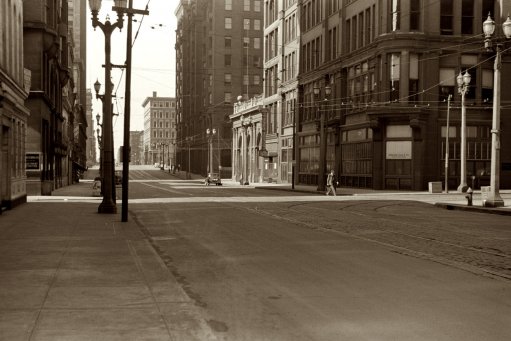On the Road: St. Louis, Missouri
Click on Thumbnail for MapUnfolding the Map
Sal hits the Gateway City, before the Gateway Arch was built, but for him the gateway points east. Click on the map to see his progress.
Book Quote
"We arrived in St. Louis at noon. I took a walk down by the Mississippi River and watched the logs that came floating from Montana in the north-grand Odyssean logs of our continental dream. Old steamboats with their scrollwork more scrolled and withered by weathers sat in the mud inhabited by rats. Great clouds of afternoon overtopped the Mississippi Valley."
On the Road, Chapter 14
Littourati Intersection
Blue Highways: St. Louis, Missouri
 Quiet downtown St. Louis street, 1940 (at Shorpy.com)St. Louis, Missouri
Quiet downtown St. Louis street, 1940 (at Shorpy.com)St. Louis, Missouri
Once, while flying over St. Louis on a cloudless day, I looked down from my window seat and saw the Gateway Arch from about 30,000 feet. Even from that height, it was clearly visible as a landmark at the edge of the Mississippi River. I vowed to myself that I would see the Arch someday from ground level.
In spring of 1993, I got my chance. I had to drive to St. Louis for business, and after 8 hours from Milwaukee I could see the Arch, it's magnificent metallic parabola beckoning travelers to pass through it to the wide open spaces of the West. Unfortunately, you can't drive underneath its span, but the symbolism is very clear.
I don't know of any other landmark in any large cities where I've been that so captures a spirit of exploration and discovery. Most landmarks are some form of large, upthrusting buildings that attempt to touch the clouds. Even though the Arch is high, it doesn't point anywhere. It's simplicity belies its amazing architectural and engineering accomplishment. One's eye travels from base upward but is then led back down to its base again. The sun's rays do not bounce off it in angles like they do off large skyscrapers, but instead seem to play around and glint in different directions. And the Arch's unique design is visible from practically everywhere in the downtown, where it frames most buildings within its arc.
I took the opportunity to take the clunking little cars, themselves an engineering marvel, up to the top of the Arch. There, in the little viewing area, I looked out across the country but, it wasn't the same as actually looking at the Arch itself from the ground. From up there, it was like looking out of any other tall building, except that I knew that instead of 50 floors stacked below me, there was nothing but air underneath the thin skin of metal holding the arch in place.
And then, I was brought back to reality as I looked down toward the river and noticed my car, which I parked in a parking area that gently sloped to the water. When I parked there, the river was some way away, but in the intervening time that I took in the museum below the arch, and then the trip up into the arch itself, the river had somehow risen and its waters were lapping at the passenger side wheels. I got on the next car down, and by the time I got to the car, water was up to the passenger door and the car was slightly bobbing on the right side. I barely got it out of there before it was claimed by the great Mississippi floods of 1993, which actually flooded the basement museum and closed the Arch.
Of course there was no Gateway Arch when Jack Kerouac came through St. Louis. But even then, St. Louis has always been seen as a gateway to the West. While much of its architecture and culture is influenced by the East Coast, it still has a Westward lean and was the last stop where travelers from the East Coast would find things that were still familiar. From there, they traveled into alien and hostile lands. The Arch, to me, is a fitting and elegant monument to this reputation as a portal to someplace different. In their travel back from the West, Jack and Sal probably found that in St. Louis, they passed through the portal back into the familiar.
If you want to know more about St. Louis
Commonspace Blog
Explore St. Louis
Gateway Arch website
Pretty War STL
The Riverfront Times Blog
St. Louis Beacon (Online newspaper)
St, Louis Daily Photo
St. Louis Places to See
St. Louis Post-Dispatch (Newspaper)
STL A La Mode
Urban Review STL
Wikipedia: St. Louis
Next up: Indianapolis, Indiana
 Gateway Arch,
Gateway Arch,  Jack Kerouac,
Jack Kerouac,  Missouri,
Missouri,  On the Road,
On the Road,  Saint Louis,
Saint Louis,  Sal Paradise,
Sal Paradise,  St. Louis,
St. Louis,  beat,
beat,  beatnik,
beatnik,  bus,
bus,  bus travel in
bus travel in  On the Road
On the Road 



Reader Comments